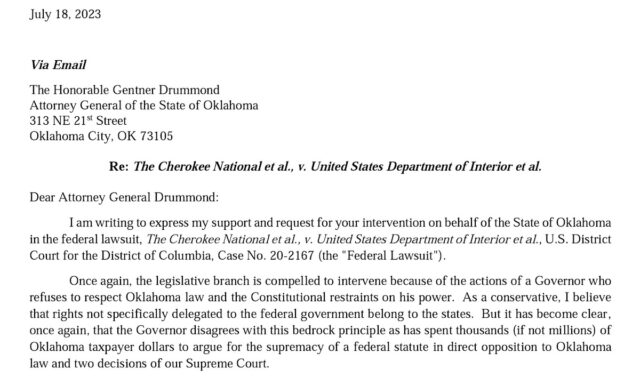

Senate President Pro Tempore Greg Treat, who says Gov. Kevin Stitt “refuses to respect Oklahoma law and the constitutional restraints on his power,” is formally asking Attorney General Gentner Drummond to intervene in a gaming compact suit filed against the governor that has lingered the past three years.
“I have no other option but to request that you intervene in the lawsuit, through whatever means you deem necessary, to defend the interests of the state,” Treat (R-OKC) wrote Drummond in a July 18 letter that is strongly critical of Stitt.
Treat and House Speaker Charles McCall filed two lawsuits against the governor in 2020, claiming the revised gaming compacts he signed with four tribes were illegal because he failed first to receive legislative approval. The Oklahoma Supreme Court ruled in favor of the legislative leaders in both cases.
But Stitt and those four tribes — the Comanche Nation, the Otoe-Missouria, the United Keetoowah Band of Cherokee Indians and the Kialegee Tribal Town — had submitted the new compacts to the U.S. Department of Interior, and they were deemed approved. When the Oklahoma Supreme Court said their new compacts violated the State-Tribal Gaming Act for authorizing gaming types such as sportsbook, leaders of the Otoe-Missouria and Comanche Nation said they would continue operating under the compacts because they were legal under federal law and contained severability clauses, meaning their casinos simply would not offer the types of games in question.
In response, four other tribal nations filed a federal lawsuit against the secretary of the U.S. Department of the Interior, Stitt and the four tribes who had signed the new compacts. That case is pending in U.S. District Court for the District of Columbia, and Drummond sent legislative leaders a letter in June about the prospect of intervening on behalf of the state.
“It has thus become clear that the governor has a conflict,” Treat wrote — and bolded — Tuesday in response to Drummond. “He can either choose to represent the interests of the state or his own personal interests, and I believe he has made his decision clear.”
In writing to Treat and McCall (R-Atoka), Drummond sought formal direction for his office to assume the defense of Oklahoma’s interests in the lawsuit filed by the Cherokee, Chickasaw, Choctaw and Citizen Potawatomi nations. (The compacts signed by Stitt with the four smaller tribes specified new casino opportunities near those tribes’ existing casino interests.)
Drummond said state law gives him the discretion “to take and assume control of the prosecution or defense of the state’s interest” in any litigation involving the state. But he asked Treat and McCall to make a formal request that his office assume the defense of the federal lawsuit, in accordance with Title 74, Section 18b(A)(3).
Treat wrote to Drummond that he believes the attorney general has the authority and doesn’t need legislative approval to intervene in the case.
“But please consider this my formal request (…) on behalf of the Oklahoma State Senate to assume control of the defense of the state’s interest in Cherokee Nation, et al. v. DOI, et al. with all required speed and diligence,” Treat said.
In McCal’s June 26 response to Drummond, he also said he believes the attorney general has “unilateral authority to take over the litigation.”
But McCall’s letter did not include the “formal” request specified in Title 74, Section 18b(A)(3), which Drummond referenced in his letter and that Treat provided Tuesday.
Daniel Seitz, communications director for the House GOP Caucus, said Thursday night that McCall’s position had not changed.
Meanwhile, Abegail Cave, Stitt’s communications director, said the governor stands by the July 11 letter that his general counsel, Trevor Pemberton, sent McCall and Treat arguing that Drummond lacks the authority to take over the state’s representation in the case.
In his letter, Pemberton said a different section of that statute, Title 74, Section 18c (A)(4), gives the governor authority to employ special counsel to protect the rights or interests of the state. He said Title 74, Section 6 also grants the governor the power to employ counsel and that an Oklahoma Supreme Court ruling made it clear that when the governor and attorney general are at odds over a litigation objective, the governor’s decision prevails under the state’s constitutional framework.
On Thursday, after the publication of this article, Cave sent a statement from Stitt.
“Pro Tem Treat is entitled to his opinion about a lawsuit brought by four large tribes against me and four smaller tribes, but I can assure you, there is nothing political about this for me,” Stitt said. “I’m fighting for the 4 million Oklahomans that I am constitutionally obligated to defend.”
Phil Bacharach, Drummond’s communications director, has said the AG is not interested in representing the governor personally, but was seeking authority to represent the state in this matter. On Thursday, he added that Drummond is reviewing Treat’s letter and “evaluating the best course of action to uphold and defend Oklahoma law.”
Lots of lawyers
Drummond’s correspondence with legislative leaders comes amid renewed tension between Stitt and the state’s largest tribes regarding jurisdictional matters in eastern Oklahoma.
On Wednesday, the 10th Circuit Court of Appeals denied the City of Tulsa’s request to stay a decision in Hooper v. City of Tulsa pending an appeal. That case involves whether municipal courts in eastern Oklahoma have the authority to enforce traffic tickets and other citations within the boundaries of the reservations affirmed following the July 2020 U.S. Supreme Court decision in McGirt v. Oklahoma. Meanwhile, Treat is expected to make a second attempt at a veto override Monday on a bill that would extend existing state-tribal tobacco compacts one year. Stitt has attempted to negotiate his own extensions that would modify geographical definitions, which he says is necessary to avoid expanded impact in a post-McGirt landscape.
In the federal gaming compact lawsuit filed in August 2020, the Cherokee, Chickasaw, Choctaw and Citizen Potawatomie nations argue that the U.S. Department of the Interior should have invalidated Stitt’s new compacts with the Comanche Nation, the Otoe-Missouria, the United Keetoowah Band of Cherokee Indians and the Kialegee Tribal Town.
The case’s most recent filing, however, was a “notice of recent authority” submitted on July 12 regarding a June 30 decision from the D.C. Court of Appeals about a Seminole Tribe of Florida compact that the Department of the Interior deemed approved in 2021 that included operation of online sports betting. The appellate court overturned a district court ruling and determined the compact is valid, noting that it complied with the federal Indian Gaming Regulatory Act.
Department of Interior attorneys submitted notice of the ruling in the Cherokee Nation case against the federal agency and Stitt because the parties had “cited the now-overruled District Court opinion in briefing plaintiffs’ pending motion to compel.”
“Among other things, the D.C. Circuit held that ‘whether or not that gaming is authorized or permissible as a matter of Florida state law falls outside the scope of the Secretary [of the Interior’s] review,'” the Department of the Interior’s attorneys wrote July 12.
In his June letter to Treat and McCall, Drummond asked the Legislature to request his office defend the Cherokee Nation lawsuit instead of the outside legal counsel hired by the governor. Those attorneys and Stitt have argued that federal approval of gaming compacts is not overturned by state court rulings in general or in the specific case at hand.
The Oklahoma Supreme Court ruled on Jan. 26, 2021, that the governor went outside the bounds of his authority and invalidated compacts made with the United Keetoowah Band of Cherokee Indians and the Kialegee Tribal Town. The state’s high court ruled July 21, 2020, that Stitt didn’t have the power to renegotiate the Comanche and Otoe-Missouria gambling compacts to allow sports betting and certain other games.
Treat said in his letter that the governor has used the federal lawsuit to argue that Oklahoma law can be ignored “because he believes federal law endows him with the singular authority to unilaterally bind the state to illegal gaming compacts.”
“He clearly is in no position to represent the state’s interest in this matter,” Treat wrote. “I can no longer stand by and watch Oklahoma taxpayer dollars be spent on high-dollar East Coast law firms in pursuit of Gov. Stitt’s personal agenda at the expense of the state’s interests.”
Pemberton’s letter noted that Sullivan and Cromwell, a firm with an office in Washington, D.C., serves as primary litigation counsel in place of a different firm that previously served as counsel. The Oklahoma City firm Ryan Whaley provides logistical support. Meanwhile, Comanche Nation citizens recently voted to switch law firms from Dorsey & Whitney to Crowe & Dunlevy.
Treat, in his letter, said the governor may choose to retain his own counsel “to push his personal agenda, but I do not believe such counsel can or should represent the state’s interest in the litigation.”
Read Treat’s letter to Drummond
 Loading...
Loading...
(Update: This article was updated at 2:35 p.m. Thursday, July 20, to include comments from Stitt and Bacharach.)




















